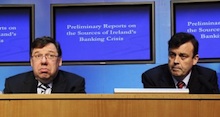
The Taoiseach Brian Cowen has denied the sovereignty of the 26-County state has been jeopardised by the banking and budget crises, even as European officials began dictating Irish economic policy.
Last week, it was confirmed by Dublin’s Minister for Finance Brian Lenihan that the cost of the bank bailout could reach an incredible fifty billion euro. With a widening budget deficit, there are now fears that the coalition government will be forced to seek international aid to fund its operations.
As a result of the bailout, the 26 County budget deficit will amount to 32% of the state’s gross domestic product this year. The government is facing increasing difficulty and expense in raising funds on international money markets.
Both the European Union and the International Monetary Fund have said they are ready to supply emergency cash if required. EU bureaucrats have already begun to suggest a new tax regime as the price of stepping in, while the IMF’s demands are understood to include sharp cuts in public services.
EU economics commissioner Olli Rehn said at the weekend that no tax policy changes should be excluded from the December budget, including the raising of the state’s low corporation tax -- provoking a sharp reaction from Dublin ministers who consider the tax rate to be sacrosanct.
Today [Monday], Cowen insisted the future of the 26-County state remains “in its own hands” and said his government could build a “sustainable economy”. He claimed his government was dealing with “a uniquely complex set of circumstances”.
“Last week, we provided certainty on the final costs of repairing our banking system. The costs involved are serious, but they are manageable. Getting banking back on track is an indispensable step in Ireland’s journey to economic recovery,” he said.
“Ireland’s future is based on developing to the full our potential for sustainable growth. Addressing our public finances and banking situation are important ingredients. But there are many others, not least the quality, skills, flexibility and resilience of our people.”
Meanwhile, his government is refusing to rule out cuts of more than 4.5 billion euro in the December budget -- a significant increase from the 3 billion previously suggested -- but has not revealed how the savings are to be made.
The prospect of both water charges and property taxes were raised in comments by Minister for Community Affairs Pat Carey on Irish television last night.
Separately, it was claimed that plans are underway to make several thousand workers in the health services redundant, by way of a voluntary redundancy programme.
The main opposition parties described as “posturing” comments by Mr Cowen that he would welcome proposals from “all political parties for the four-year austerity plan for the economy”.
Sinn Fein President Gerry Adams called on Fine Gael and Labour to support his party’s no confidence motion in the Minister for Finance, if they are serious about ending Cowen’s weak hold on power.
He also said the coalition government had no mandate for what it is doing.
“This week it refused again to hold overdue by-elections. Sinn Fein Senator Pearse Doherty will have the government before the courts on this issue on 18 October.
“Unlike the government parties as well as Fine Gael and Labour, Sinn Fein doesn’t accept that cutting 3 billion euro from public expenditure in December’s budget is a good idea. This will merely deepen the recession and lead to further job losses.”
“In November we will launch a budget alternative, arguing for a stimulus package to create jobs and help ordinary people.
“We are also calling on people across Ireland to voice their opposition to the government’s policies, in advance of that budget, by taking to the streets of Dublin on 4th December.
“Let’s make a stand.”
![[Irish Republican News]](https://republican-news.org/graphics/title_gifs/rn.gif)
![[Irish Republican News]](https://republican-news.org/graphics/title_gifs/harp.gif)

